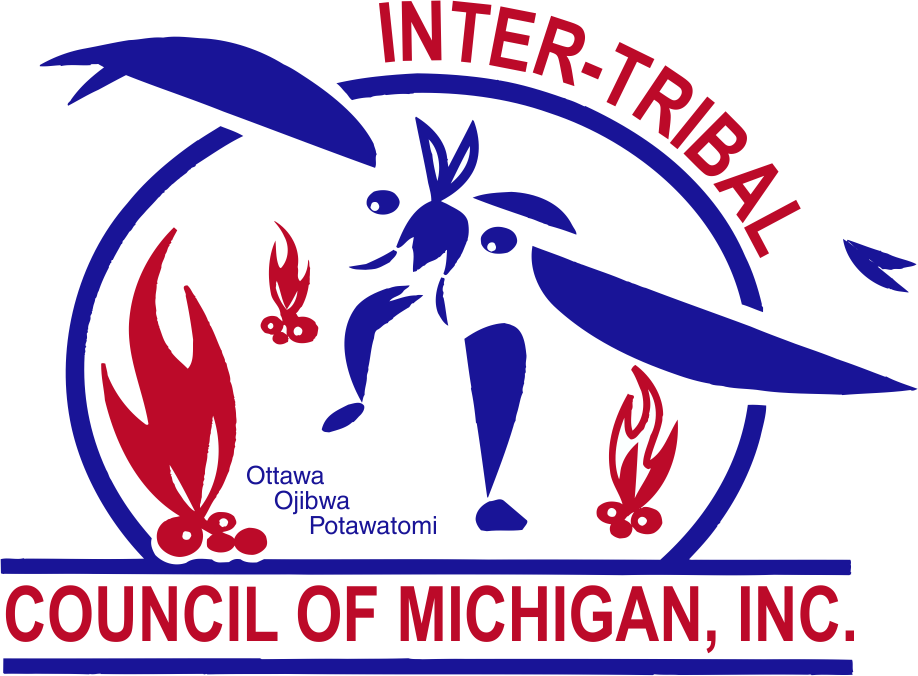Inter-Tribal Council of Michigan, Inc. (I.T.C.) was incorporated as a 501 © 3 non profit organization on April 16, 1968 by the four original tribes, those being: Bay Mills Indian Community, Hannahville Indian Community, Keweenaw Bay Indian Community, and the Saginaw Chippewa Indian Tribe.
The original purpose was to establish a joint Tribal organization of the four Indian communities and all such other Indian villages or communities as may seek membership to conserve common property, to develop common resources, to promote the common welfare of the members of the participating member tribes, to negotiate with the Federal, State, and Local governments on all matters within the concept of improving the socio-economic status of Michigan Indians, and in general to carry on any activities in connection with being non-profit under the state laws of Michigan.
The Agency was created out of financial necessity. The four tribes were so small in population that an organization combining all the numbers could generate more fundable programs for much needed delivery services to tribal members. These four tribes along with the other Indian communities that existed at that time can tell you that life was not good for American Indians during this period. The communities suffered extreme poverty, high unemployment, poor housing conditions, poor health care, and other basic services were not readily available for most Indian people. The Inter-Tribal Council was the frontier consortium that allowed a beginning to these four small tribes working for self-sufficiency and better services for their people.
As the Agency became more established, it received the designation of being a Limited Purpose Indian Community Action Program, which opened the door to the anti-poverty programs similar to other Community Action Agencies, such as Low Income Energy Assistance Programs, Commodities, Head Start, Weatherization, etc. Inter-Tribal Council also began working with the Bureau of Indian Affairs to implement a social services programs and the Manpower Program where funds were used to create more job opportunities on the reservation. ITC also began working closely with the Indian Health Services, which ultimately led to the implementation of the contract health dollars used by tribal members to receive health care and an Indian Health Field office that was housed at Kincheloe for many years. Home Improvement funds were obtained and a whole array of other services were sought and implemented over the years on behalf of the participating tribes.
The Sault Ste. Marie Tribe of Chippewa Indians joined the Agency in 1985. Lac Vieux Desert Band of Lake Superior Chippewa Indians became an official member in 1988, and the Grand Traverse Band of Ottawa and Chippewa Indians became an official member shortly after. For many years the Agency operated under these seven tribes with significant changes occurring on each reservation as they became more and more independent. The bigger tribes always maintained their independence operating as many programs under their own umbrella as possible. The smaller tribes were also becoming more organized and as they developed their infrastructures and gained in population, began assuming more of the Bureau and Indian Health programming. Today all of the member tribes operate the majority of initial programs that were once housed at ITC.
Today ITC is comprised of all twelve federally recognized tribes in Michigan. Those being: Bay Mills Indian Community, Hannahville Indian Community, Keweenaw Bay Indian Community, Saginaw Chippewa Indian Tribe, Grand Traverse Band of Ottawa and Chippewa Indians, Little Traverse Bay Bands of Odawa Indians, Sault Ste. Marie Tribe of Chippewa Indians, Lac Vieux Desert Band of Lake Superior Chippewa Indians, Match-E-Be-Nash-She-Wish or Gun Lake Tribe, Pokagon Band of Potawatomi Indians, Little River Band of Ottawa Indians, and the Nottawaseppi Band of Huron Potawatomi.
Our Agency is divided into several different divisions, which include Health Services, Behavioral Health, Environmental Services, Child, Family, and Education Services, and Administration. The Agency employs approximately 160 employees 35 of these employees are based in the Agency’s central office in Sault Ste. Marie, while members tribes have offices and staff on site.


